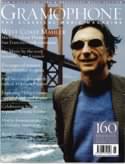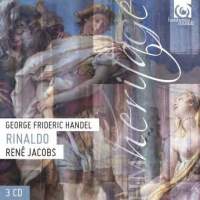Texte paru dans: / Appeared in: |
|
|
Outil de traduction (Très approximatif) |
|
|
Reviewer: Stanley Sadie
Rene Jacobs always brings a certain individual dramatic flair to the Baroque operas that he records, and Handel's Rinaldo is no exception. The work offers generous opportunities.
This was Handel's first opera for London, put together almost entirely from music he had already composed, mainly in operas, cantatas and oratorios from his Italian years, and he found plenty of colourful and characterful music to garnish the story of Rinaldo and Armida, a tale of love, magic, bewitchment and betrayal set in the Crusades. Handel picked out many of the plums from his recent works, and served up a sumptuous plum-pudding for his London audiences.
Jacobs garnishes it generously, supplementing the written notes of the score in a number of ways, described in his notes in the accompanying booklet. They include in particular enriching the continuo part, and varying its colour, with harp and organ and a chord-playing cello (it supplies various flourishes too), and drawing on the famous Babell arrangements of some of the arias for the harpsichord part, notably for the huge cadenzas in the final aria of Act 2. I'm not entirely persuaded by his arguments, which dubiously cite Monteverdi's practices a long century before, nor by the results, perhaps especially the sundry scrubbing and grunting from the cello, not to mention the use of castanets in one number. He also adds a good deal of percussion - whacks on drums, gong, thunder-sheets and so on - to convey the stage impact of Armida's magic; there is a lot of distant hissing and rumbling, too, at times. He clearly allows his players plenty of scope for improvisation and rewriting, which some may find convincing. 'This,' he says, 'is not cheap showmanship if the conductor and his partners play the effects game to the hilt.' You may not always agree.
For my own part, I don't quite follow his logic, and would favour an interpretation that simply gave the maximum scope to Handel's music, which I always feel works pretty well without supplementary aids. I also find myself preferring the kinds of tempo that Handel is likely to have favoured. Jacobs, understandably eager to make the most of every opportunity, is apt to drive the fast music: listen for example to the duet of recrimination between Rinaldo and Armida in the middle of Act 2, which demands considerable athleticism from strings and singers alike , or the rather scrambled fast section to the Act 3 Sinfonia, or the duet in that act for Armida and Argante. A tempo just a shade too fast for comfort does, of course, tend to enhance the drama. On the other hand, some of the slow numbers are drawn out excessively: a conspicuous example is 'Lascia ch'io pianga', which is terribly static (and not to my mind enhanced by the harp doodlings or the elaborate ornamentation). Armida's beautiful 'Ah! crudel' is another victim, in both directions, a main section that barely moves at all and a furious middle section (well, it 's meant to be - Handel marked it Presto - but this surely goes beyond anything he would have imagined). Strongly accented orchestral playing also produces powerful, sometimes alarming effects, though surely this kind of rough and explosive sound (period instruments easily become harsh when forcefully played) is surely alien to the refined and elegant age to which the music belongs.
The singers are a strong and unusually unified team: all of them firm and clear of voice. The original primo homo role of Rinaldo is taken by a mezzo, Vivica Genaux, who draws a fine, slender line of tone, and sings the lovely 'Cara sposa ' with real passion, and her next aria, the showpiece that ends the First Act, has some splendidly defined and incisive singing. The other castrato role , Eustazio, goes to Christophe Demaux, a light and even countertenor. I was much impressed, too, by the other countertenor in the cast, Lawrence Zazzo, as the Christian general Goffredo - a very accomplished singer, clean and refined in sound and articulation, again beautifully even in tone. His little aria in the last Act is done with much delicacy.
lnga Kalna shows considerable power, dramatic as well as vocal, as the sorceress Armida, with a properly imperious manner in Act I and colouring the voice to comprehend tragedy and fury in the arias ending Act 2 (the last one, 'Vo far guerra', includes the lengthy harpsichord solos, done with due virtuosity by Nicolau de Figueiredo). She does not entirely avoid vibrato. One might have looked for a softer and warmer soprano for Almirena, Rinaldo's true love, but the role is sung very precisely and rhythmically and with much delicacy by Miah Persson. The bird-song, 'Augeletti', is charmingly sensuous, with exquisite recorder playing and the twittering of 'real'birds, at an extremely slow tempo. As Argante, James Rutherford shows a strong bass, able to bluster where needed but with softer tones too. All the singers are subject to a good deal of arbitraly rewriting of the vocal lines in the guise of da capo ornamentation.
For all the excellence of Jacobs's singers, they do not surpass Christopher Hogwood's on the version, issued two years ago, cited above.
With a cast headed by Cecilia
Bartoli, David Daniels, Bernarda Fink, Gerald Finley and Luba Organasova , the
singing is of high quality; and unless you prefer the 'effects game' of the new
version I am sure you will find the much more direct and more stylish approach
of the Hogwood set better attuned to Handel and this early masterpiece. |
|
|
|
|
|
Cliquez l'un ou l'autre
bouton pour découvrir bien d'autres critiques de CD |
|




